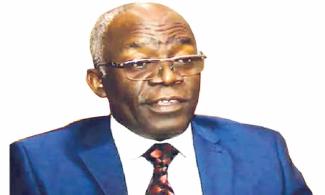
The renowned human rights lawyer said this on Wednesday while speaking at the maiden edition of the Yinka Odumakin Inter-faculty Debate and Public Lecture held by the Student Union of the Obafemi Awolowo University, Ile-Ife, Osun State.
Human rights lawyer, Femi Falana, SAN, has warned the President Bola Tinubu-led Nigerian government not to allow state governments that are currently struggling to pay N30,000 minimum wage to their workers to create state police.
The renowned human rights lawyer said this on Wednesday while speaking at the maiden edition of the Yinka Odumakin Inter-faculty Debate and Public Lecture held by the Student Union of the Obafemi Awolowo University, Ile-Ife, Osun State.
Falana argued that the creation of state police is not the lasting solution to the security problems in Nigeria.
The lawyer added that the “governments should acquire the vital security equipment to track kidnappers, terrorists and the so-called unknown gunmen. Nigerians should not be deceived into believing that the establishment of state police is the panacea to insecurity in the country.”
He continued, "A state police that is not well equipped and adequately funded can never confront and contain insecurity. State governments that cannot pay the national minimum wage of N30,000 per month should discard the idea of setting up state police.
“We must avoid a situation whereby members of a state police service are owed salaries and allowances for several months. Therefore, the salaries and allowances of all security officials should be deducted from source and paid to them directly.”
“We must also realise that a well-equipped and well-funded police service cannot address the crisis of insecurity if mass unemployment of youths is not addressed.”
Falana equally berated the lack of political willingness of state governments in the country to improve basic education.
He said, “I was a member of the Alliance of Progressive Students (ALPS), a student socialist group. Yinka was also a member of the ALPS. I was the Public Relations Officer of the student union during the 1979/80 academic session.
“Yinka Odumakin held the same post in this university about 8 years later. At the material time, the Ibrahim Babangida military junta had proscribed any form of "political extremism" on the campuses. Soyinka and 7 of his colleagues were expelled for leading an anti- government protest in 1988.
“The Alao Aka-Bashorun's Peoples' Chambers directed me to challenge the expulsion of Yinka and his colleagues. We did and the Osun State High Court sitting at Ile-Ife ruled that the dismissal of the students infringed on their fundamental rights to fair hearing, freedom of expression and association.
“The university complied with the order but informed the military authorities in Abuja that the judgment which reinstated Yinka and his colleagues had been challenged at the Court of Appeal. Thus, they were able to graduate from this university.
“The Ife experience completely radicalised Yinka who vowed to continue to contribute his quota to the struggle for justice and fair play in the country. We worked together until we parted ways politically when he decided to pitch his tent with Afenifere.
“Notwithstanding our ideological differences, we were compelled to work together in the struggle against military dictatorship and civilian autocracy. Unfortunately, we lost Yinka to the system as he was unable to receive adequate medical treatment during the Covid 19 pandemic.
“In celebrating Yinka on this occasion, I am convinced that the student union had resolved to reconcile itself with the struggle of the Nigerian people to break with an inglorious past.
“The Child Rights Act applicable in the Federal Capital Territory has been adopted by the 36 states of the Federation. Under the law, every child is entitled to free and compulsory education from primary and junior secondary school.
“Similarly, the Free, Compulsory Universal Basic Education Fund Act guarantees the right of every child to basic education. The law mandates state governments to contribute 50 per cent of the costs of projects to be executed in their states by UBEC.”
“According to UNESCO, 20.2 million Nigerian children are out of school, the second highest rate in the world behind India.”
“As of December 11, 2023, the total amount yet to be accessed by 29 state governments was N68.7 billion while only seven state governments contributed the matching grant of N10.6 billion to access the grant for the promotion of basic education in their respective states in 2023.”
“Since appeal by parents and other stakeholders to state governments to access the fund fell on deaf ears, our law firm has filed a suit at the Federal High Court to enforce the right of every child to education in Nigeria. As a matter of urgency, on the Federal Capital Territory and the indicted 29 state governments to pay counterpart fund to access the grant.
“The Buhari administration increased the tertiary education tax from 2.5 percent to 3 percent last year. The tertiary education tax is imposed on every company at the rate approved by the President of the assessable profit for each year of assessment.
“The funds are disbursed for the general improvement of education in federal and state tertiary institutions, specifically for the provision or maintenance of essential physical infrastructure for teaching and learning; instructional material and equipment; research and publications.
“In June 2023, the Bola Tinubu administration enacted the Students Loans (Access to Higher Education) Act to create a legal framework for granting loans to indigent or low-income Nigerians to facilitate the payment of their tuition fees.
“ASUU rejected student loan scheme on the ground that it would lead to perpetual indebtedness for beneficiaries and that it would not provide universities with enough funds to function effectively.
“No doubt, ASUU's suggestion cannot be dismissed in view of the fact that a similar loan scheme introduced by the defunct military junta in 1976 had failed.
“But NANS has arrogantly asked ASUU not to obstruct the implementation of the program, which will enable more individuals to access higher education, especially those who are financially disadvantaged.”